
Moonpreneur
Update: This article was last updated on 7th January 2026 to reflect the accuracy and up-to-date information on the page.
People will forget what you said, people will forget what you did, but people will never forget how you made them feel.
– Maya Angelou
Public speaking is considered a noble skill in modern society and critical for communication, leadership, etc. According to best-selling author Jason Capital, being a public speaker is one of the highest-paying professions in the world, in which speakers may earn tens of thousands of dollars for short-length talks at seminars, conferences, and businesses.
Public speaking important for children and provides a highly valuable foundation in developing communication, confidence, and articulation at an extremely young age. Structured learning assists in developing these important skills that enhance their ability to present thoughts effectively and confidently.
Recommended reading: Community Helpers for Kids: Engaging Activities and Learning Resources
This blog discusses the benefits of public speaking for kids.
The Benefits of Public Speaking
Recommended reading: Enrichment activities for kids: Encourage Learning And Personal Development
1. Builds confidence:
Public speaking helps the kids have a chance to come out of their comfort zones, communicate views, and control the feedback received. This develops a higher level of confidence in which they are to communicate and express thought processes with ease, free from stammering or stumbling.
2. It enhances the children’s communication skills:
This helps children to improve their communication skills for both academics and personal levels.
This is where public speaking offers more benefits in terms of attaining the perfect articulation, pronunciation, and even clarity of thought to individuals becoming confident about presenting their ideas. The more they practice, the better they become at expressing their ideas and thoughts.
Other benefits of public speaking include the improvement of listening skills to better respond and understand audience expectations. It must boost persuasive communication abilities to increase other benefits it is supposed to offer in future academic and professional undertakings; hence, effective engagement and connection with others.
3. Develop critical thinking skills:
Public speaking skills enhance powerskill and lead to the future development of kids, which is developed by learning to organize thoughts logically, which fosters effective communication and quick thinking. It improves problem-solving abilities and allows them to respond aptly to unexpected questions or challenges, thus making them confident and articulate speakers.
4. Improves memory and concentration:
- It entails public speaking for children, and speaking in public enhances children’s concentration as well as their memory or recall abilities.
- Preparation of speech involves note-taking and making orderly notes on a subject to be discussed; the ability to concentrate is enhanced more.
- Children are more likely to pay attention, remember information, and respond accordingly if they are active listeners to their audience.
5. Develop leadership skills:
Has anyone ever pondered the reasons behind public speaking and its necessity for students?
- Leadership comprises characteristics such as self-confidence, confidence, accountability, good communication skills, rational thinking, empathy, integrity, flexibility, creativity, and problem-solving capabilities.
- Excellent leaders master oratory skills in which they influence their crowds, change minds and accomplish so much.
- Public speaking helps develop children to speak confidently, convincingly, and responsibly regarding their messages.
- Moreover, it enhances their interpersonal skills, including teamwork, active listening, and empathy, contributing to their overall leadership development.
6. Overcome stage fright:
- Public speaking can be daunting, causing fear, anxiety, and nervousness, especially for those not exposed to speaking in front of large audiences.
- However, those who learn to practice it can easily conquer these fears. People develop those ways of coping and regulating emotions, body language, and uttering speed. Public speaking, in addition, provides resilience, granting children a sense of accomplishment, raising their level of confidence and self-esteem through achievement.
- Public speaking for children is a very important part of the personal and academic development of children. It helps develop self-confidence, effective communication skills, and critical thinking. Effective public speaking helps in improving memory, concentration, leadership qualities, and the elimination of fear and anxiety.
Recommended reading
- Top Tips For Finding The Right Summer Camp For Your Kids In 2025
- 10 Smart Tips For Career Planning for Kids
- Benefits of Boot Camp for Kids
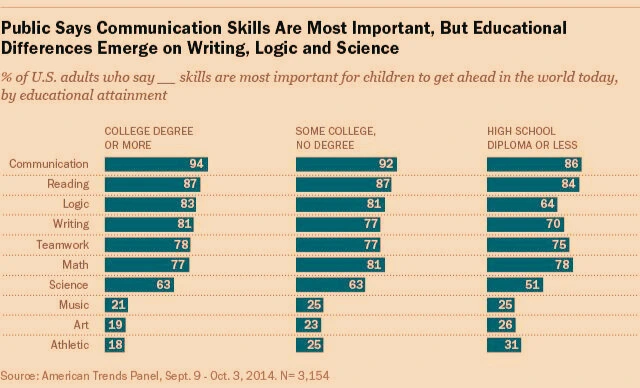
This is a graphical representation of data provided by PEW RESEARCH CENTER about the importance of communication skills for kids in every aspect of their lives.
Moonpreneur is the force that breaks off the barriers created by conventional teaching and brings it to a practical level so it can provide future-ready skill sets in tomorrow’s next-gen workforce. Under its Innovator Program, tomorrow’s future worker is groomed through learning training in AI/ML, Robotics, Coding, IoT, Apps, and thereby entrepreneurship by hands-on experience.





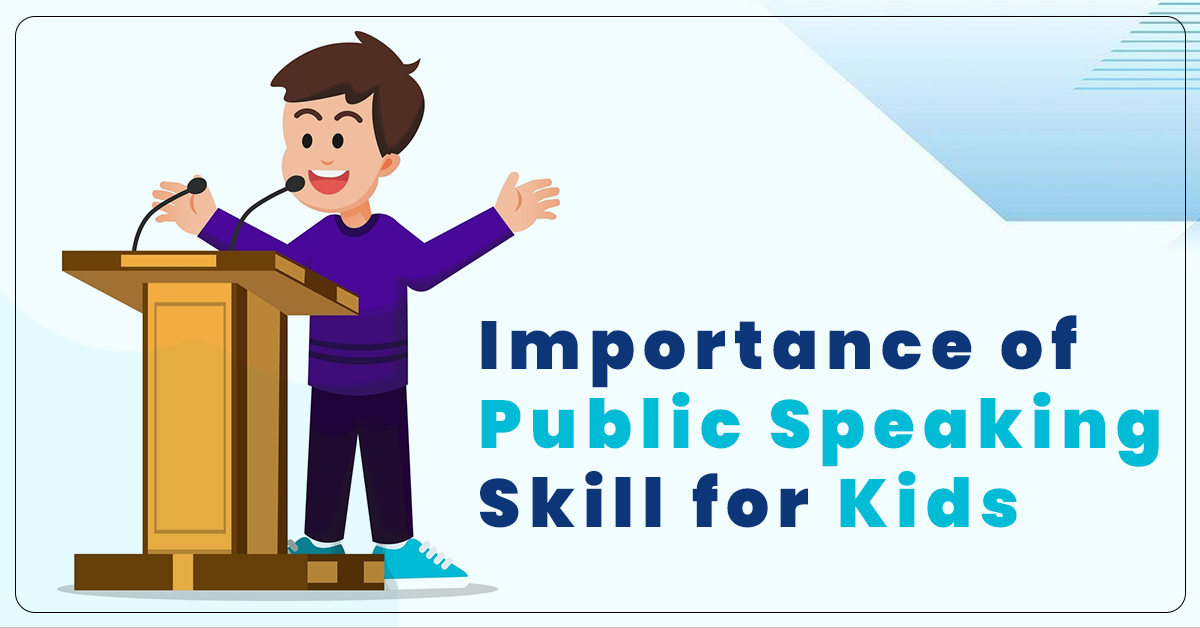
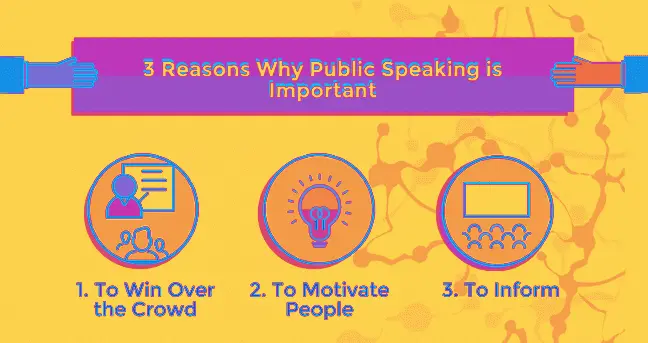
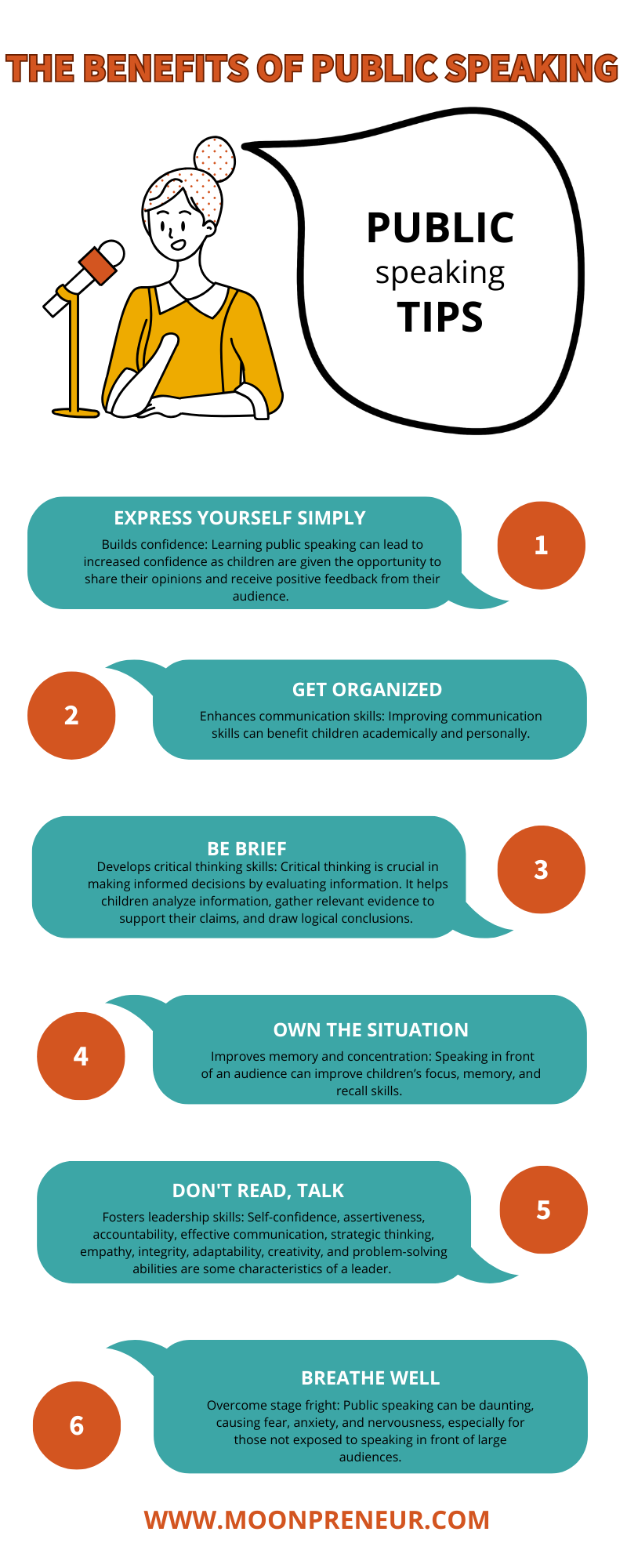

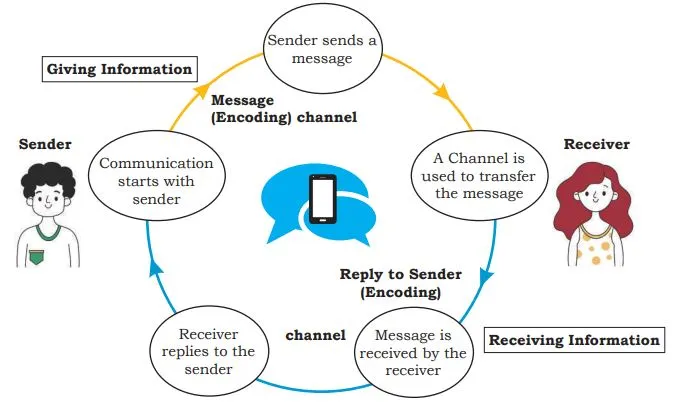





















When I was a kid, I used to get very nervous while speaking in front of a crowd! My parents helped me in practicing speeches at home, and over time, I got more confident. Now, I see my own child facing the same fear, so I am trying similar techniques to help him out.
One thing I recommend everyone to try out is storytelling method. It really helps kids to get comfortable with public speaking. I remember my niece struggled at first, but when she started telling made-up stories instead of rehearsed speeches, she became way more confident!